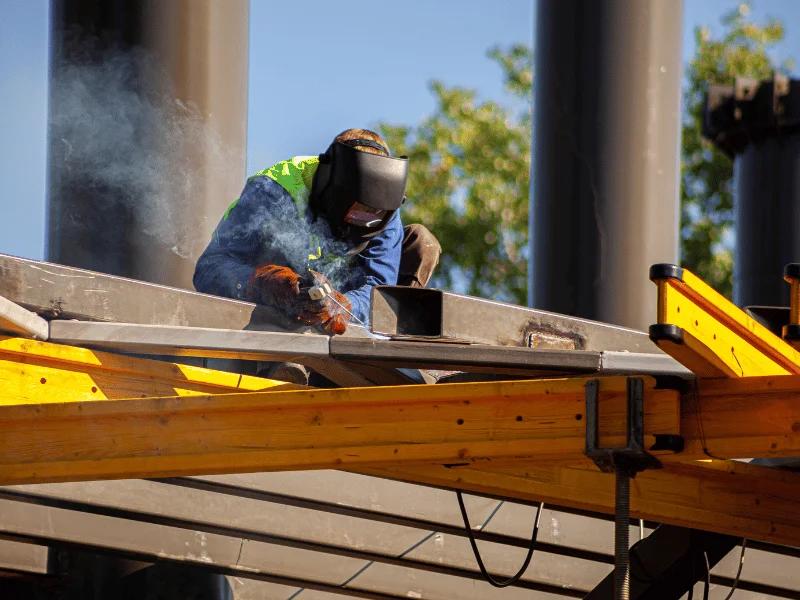Rig welding, an adventure-filled profession, is essential in the construction and maintenance of structures in the oil and gas industry. This guide is your gateway to understanding what it takes to excel as a rig welder, covering everything from essential techniques to career pathways.
What is a Rig Welder?
Rig welding, a specialized branch within the welding domain, primarily serves the oil and gas sectors. It involves the construction, repair, and maintenance of infrastructure crucial for energy extraction and processing. This field requires welders to possess a unique blend of skills to tackle the challenges presented by working on oil rigs, both onshore and offshore.
Core Techniques in Rig Welding
To thrive in rig welding, mastering a variety of welding techniques is imperative:
- TIG Welding: Demands precision and is key for working with delicate metals.
- MIG Welding: Known for its efficiency, especially in pipeline and basic metal projects.
- Stick Welding: Offers versatility and reliability, ideal for harsh environments.
- Flux Cored Arc Welding: Preferred for its deep penetration and suitability for thick materials.
Each technique has its own place, demanding skill and practice to master.

Pathways to Certification
Advancing in rig welding often involves obtaining specific certifications that underscore a welder’s proficiency. Certifications from the American Welding Society (AWS) and the National Center for Construction Education and Research (NCCER) are among the most valued, covering a range of processes and skills essential for a successful career in the field.
Choosing the Right Equipment
The effectiveness of a rig welder also hinges on the equipment they use, which must endure the challenging conditions of remote and rugged environments. Key considerations include selecting versatile and durable welding machines, investing in high-quality personal protective equipment (PPE), and equipping oneself with specialized tools tailored for rig welding tasks. The role of a rig welder requires not only skill and knowledge but also a significant investment in the right tools and equipment. They often need to provide their own equipment, which includes but is not limited to welding machines, grinders, welding leads, and protective gear. The initial investment in high-quality equipment is crucial for ensuring safety, efficiency, and the ability to tackle a wide range of welding tasks on the rig.
The Importance of a High School Diploma or GED
The foundation of a career in rig welding often starts with obtaining a high school diploma or GED. To apply to the majority of trade schools, you will require one of these documents. This basic educational requirement is crucial as it demonstrates the individual’s ability to complete a structured educational program, which is essential for the critical thinking and technical skills needed in this field.
Trade School Education: A Gateway to Rig Welding
Enrolling in a trade school like the Universal Technical Institute (UTI) can significantly jumpstart a career in rig welding. UTI’s 36-week Welding Technology program, created in collaboration with Lincoln Electric, provides an immersive learning experience in welding. The program covers essential welding techniques such as Gas Metal Arc Welding (GMAW), Shielded Metal Arc Welding (SMAW), Gas Tungsten Arc Welding (GTAW), and Flux-Cored Arc Welding (FCAW), equipping students with the skills necessary for entry-level positions in the welding industry, including rig welding.
Apprenticeships for Rig Welding
Completing an apprenticeship is another critical step towards becoming a rig welder. Apprenticeships offer hands-on experience and a deeper understanding of the rig welding profession, allowing aspiring welders to learn from experienced professionals in real-world settings. This practical experience is invaluable, providing insights into the day-to-day challenges and requirements of these jobs.
Offshore and Onshore Rig Welding
Rig welders may find themselves working in various locations, including offshore and onshore oil extraction sites. Offshore rigs, located in ocean waters, offer a unique set of challenges due to their isolation and the harsh marine environment. Onshore rigs, while more accessible, still require a high level of skill and adherence to safety protocols due to the nature of the work. The life of an oil rig welder is far from ordinary, with unique challenges that affect both work and home life.
These professionals often work under fly-in fly-out arrangements, leading to prolonged periods away from home, which can strain personal relationships.
Living Arrangements and Work Schedules
Rig Welding schedules are intense, typically involving 10 to 12-hour shifts for continuous stretches without days off, demanding both physical and mental stamina. Accommodations on rigs are shared, fostering a communal living experience, and while meals are provided, maintaining a healthy lifestyle in such an environment is a challenge. To keep their welding skills sharp amidst potentially repetitive tasks, welders are encouraged to engage in regular practice and training. The cyclic nature of work—on for several weeks, then off for an equal rest period—requires a robust support system and a resilient mindset to navigate the demands of this high-stakes profession.
Rig welders operate in unique environments that present distinct challenges and opportunities. Understanding these aspects is crucial for those considering a career in this field.
The Benefits and Challenges of a Rig Welding Career
A career in welding rig comes with its set of rewards and challenges. From job security and competitive salaries to unique travel opportunities, the benefits are substantial. However, aspiring rig welders must be ready to tackle the demands of extensive training, physical challenges, and the need for ongoing skill development.
The Future of Rig Welding
Rig welding is evolving, with trends like automation, robotics, and digitalization shaping its future. These advancements are set to enhance efficiency, precision, and safety, offering new opportunities for those skilled in navigating these technologies.
Conclusion: Stepping into Rig Welding
Rig welding is not just a job; it’s a career that offers growth, adventure, and the chance to be part of an essential industry. With the right training, such as UTI’s Welding Technology program, and a commitment to continuous learning and safety, aspiring welders can navigate their way to a successful career.
